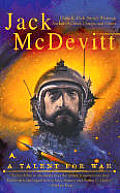
| Series: | Alex Benedict #1 |
| Publisher: | Ace |
| Copyright: | February 1989 |
| ISBN: | 0-441-01217-5 |
| Format: | Mass market |
| Pages: | 310 |
Alex Benedict is an antiquities dealer, raised by an archeologist uncle but choosing (to his uncle's dismay) to go into the commercial side of the business. He lives in a familiar far future of relatively convenient space travel and better computer technology (more on that in a moment), minding his own affairs and not leaving much of a footprint on the universe. But when his uncle dies in a highly unusual starship accident, he's left a surprising inheritence and the fragments of a puzzle surrounding a legend of history that he can't help but investigate.
This is the first of a loosely-connected series of novels about Alex Benedict and also the first I've read of Jack McDevitt. It is, in setting, something of a surprise these days. McDevitt's future world has a long purely human history (millennia) apparently free of human uploads, nanotech, and Singularities, featuring a human hegemony connected by old-fashioned faster-than-light travel. There is ubiquitous use of virtual reality on the many developed colony worlds, but apart from that it could be easily mistaken from the science fiction settings of decades past. It gives the story a quaint feel that's both comfortable and oddly prosaic.
Against that background, McDevitt tells a war story of a fight against hostile aliens, but from a unique perspective. In Benedict's time, the war is long past, the border has settled into a protracted truce, and the events of the early battles and infighting among the scattered human colonies have faded into legend. But the time of the war, and the legend of the first and greatest human war leader Christopher Sim, that his uncle's investigations concern. His uncle made a startling find that sent him on his ill-fated flight, but the details are stolen early and Alex has to painstakingly reconstruct them.
It's this perspective that gives A Talent for War its understated appeal. This isn't a book to grab and hold the reader; the prose is unadorned, Alex is a straightforward and logical (if self-centered) first-person narrator, and the characterization of most of the cast frankly leaves something to be desired. But in its puzzling out of history, it evokes the sort of fascination TV shows like History's Mysteries strive for. The portrayal of archeological and historical work feels right. There are dead ends, witnesses with suspect motives, lies and exaggerations, papers and memoirs that are frustratingly elliptical or written by people only ancillary to the investigation, and even a wonderfully-portrayed crackpot historical society. Despite the title, this is not military fiction. McDevitt achieves his suspense with very little violence apart from historical reconstruction and with only a few true action scenes. His hero thinks his way through an intellectual puzzle that nonetheless provides a satisfying, tense conclusion.
I fear this is the sort of SF novel whose appeal would be lost on someone coming from outside the genre. It has a lot of the standard failings of SF, including far-too-human aliens and a main character who seems to have little life outside of what's required for the story. But despite that, McDevitt does more than just tell a story. A Talent for War is also about how legends form and are intentionally created, how people become invested in them, and how much more complicated the past is than the history books. He plays gentle games with the reader the whole way, baffling expectations, throwing out red herrings, and reversing our feelings about Christopher Sim so many times that we can identify with the complicated feelings of the characters. The world-building won't thrill anyone, but A Talent for War sustains a satisfying puzzle at novel length, something that's not at all easy to do.
If you enjoy historical research puzzles, or even working out continuity in comic books, keep an eye out for this one. It's a solid, workmanlike story in a classic, comfortable setting with an unconventional plot driver. I liked it more than I expected to.
Followed by Polaris.
Reviewed: 2008-02-24